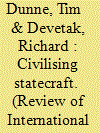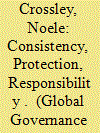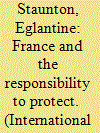| Srl | Item |
| 1 |
ID:
155156


|
|
|
|
|
| Summary/Abstract |
In this contribution to the forum marking the publication of Andrew Linklater’s remarkable book on Violence and Civilization in the Western States-Systems we first locate the book in the context of Linklater’s overarching intellectual journey. While best known for his contribution to a critical international theory, it is through his engagement with Martin Wight’s comparative sociology of states-systems that Linklater found resonances with the work of process sociologist, Norbert Elias. Integrating Wight’s insights into the states-system with Elias’s insights into civilising processes, Violence and Civilization presents a high-level theoretical synthesis with the aim of historically tracing restraints on violence. The article identifies a tension between the cosmopolitan philosophical history which underpins the argument of the book, and which has underpinned all Linklater’s previous works, and the ‘Utrecht Enlightenment’ that offers a conception of ‘civilized statecraft’ at odds with a universal conception of morality and justice. The article then examines Linklater’s argument about the ‘global civilizing process’ as it applies to post-Second World War efforts to build greater institutional capability to protect peoples from harm. It is argued that Linklater over-estimates the extent to which solidarism has civilised international society, and that the extension of state responsibilities and development of civilised statecraft owe more to pluralism than solidarism.
|
|
|
|
|
|
|
|
|
|
|
|
|
|
|
|
| 2 |
ID:
174655


|
|
|
|
|
| Summary/Abstract |
Selective humanitarianism, it has been argued, may be condonable, or even preferable. Several arguments have been proffered in support of these views. This article revisits these arguments in light of the emergence of a discourse of protection and responsibility that now incorporates a wider spectrum of protection measures available to agents, of which armed intervention is but one. Consistency is an essential characteristic of ethics and the law—inconsistent practice diminishes the prospects of the development of norms of protection and associated practices and institutions. Furthermore, inconsistent practice means that fewer people receive protection from egregious violations of human rights. If the principles associated with human protection and humanitarianism are to become established norms of international society, international policy must be coherent, and international practice must be consistent.
|
|
|
|
|
|
|
|
|
|
|
|
|
|
|
|
| 3 |
ID:
161655


|
|
|
|
|
| Summary/Abstract |
Although France has been a key actor of human protection since the 1980s, the existing literature often adopts an Anglo-Saxon focus or concentrates on states which have been reluctant to see international norms of human protection develop. As a consequence, it overlooks France’s central role in the development of the Responsibility to Protect (R2P), which can be seen as the leading norm of human protection today. In turn, the growing influence R2P has had on France’s conception and practice of human protection – and on its foreign policy more generally – remains unexplored. This article is the first of its kind to correct these oversights by examining France’s relationship to R2P from its emergence till date. It argues that to do so, we need to analyse the evolving relationship of two interconnected – yet distinct – norms: France’s domestic norm of human protection on the one hand, and the international norm of R2P on the other. It builds on the constructivist literature to offer a theoretical framework that allows the study of this tale of two norms and draws upon elite interviews of key actors such as Gareth Evans and Bernard Kouchner to provide a unique understanding of France’s relationship to R2P. Through this tale of two norms, the article reshapes our understanding of both R2P and France’s past and current foreign policy. In addition, it contributes to the literature on norm diffusion, in particular by deepening our understanding of how domestic and international norms interplay.
|
|
|
|
|
|
|
|
|
|
|
|
|
|
|
|